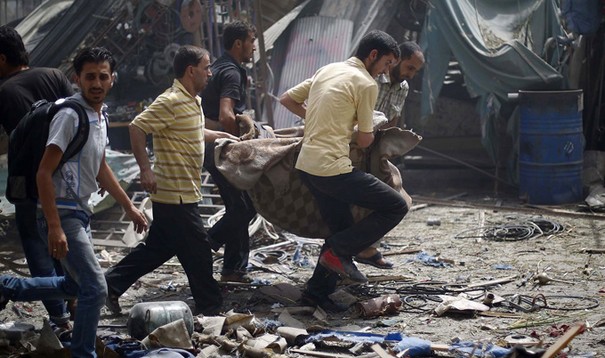The rebels opposed to the regime of Bashar al Assad have come under immense pressure due to heavy Russian airstrikes in Syria as well as ground assaults by loyal forces and their allies.

Months of Russian airstrikes in Syria have considerably weakened the rebel forces and strengthened the ever-defiant Bashar al Assad. This has rendered it very difficult for the United Nations to start comprehensive peace dialogues between the warring parties.
Rebels in the west of the country are being hit much harder by the Russian airstrikes in Syria. On the other hand, the Islamic State is also under heavy pressure in the central and eastern parts of the country. The oil smuggling operations of the group are also hit hard by diving international prices which has made it very difficult for the group to pay salaries to its fighters.
Rebels groups are reporting continue Russian airstrikes in Syria. Moreover, ground assaults have also been reported in parts of western Syria. This is the most valuable piece of land from Bashar al Assad’s perspective.
Moreover, Russian airstrikes in Syria have enabled the regime forces to make the most important gain during the previous few weeks of fighting: it has recaptured the town of Salma situated in the Latakia province.
These recent gains, however, do not mean that there will be a reversal of fortune for Assad. Rebels are fighting back fiercely and there are several territories that have switched hands time and again. High level of attrition is reported on the front lines in Western Syria.
Military officers who are close to the heart of the regime in Damascus are saying that the first priority of the troops loyal to Bashar al Assad is to close the border with Turkey. A high placed military source added that Russian airstrikes in Syria had also brought Turkish supply lines to rebels under immense pressure.
Turkey is a staunch supporter of Syrian rebel groups and is allegedly backing the insurgency in its neighboring country. The intensity of the ongoing fighting had made it extremely difficult for the UN special envoy to Syria, Staffen de Mistura as he seeks to open peace talks between the warring parties.
Though the UN efforts have been vetted by the US and Russia, the situation in the ground suggests that the deadly civil war has still not reached a point where it would be open to peacemaking efforts.
The rebels in most of the areas have gone into a defensive mode due to a massive mobilization of regime troops and its supporters as well as Russian airstrikes in Syria that show no signs of abating.
Rebels groups are playing down the importance of regime gains, however, they are complaining that their foreign backers are not providing enough hardware to confront the combined onslaught of Russian, Iranians and Syrian forces.
“These are among the difficulties facing the FSA on the ground especially since the aerial bombing is affecting some headquarters, equipment, cars and personnel and the aid given is little compared to the ferocious attack,” an FSA commander recently told Reuters.
A western diplomat recently confided in a news reporter that he was surprised that the Rebel groups were still holding out in Syria despite Russian airstrikes in Syria, and assaults by Hezbollah as well as other foreign backers of the regime.
